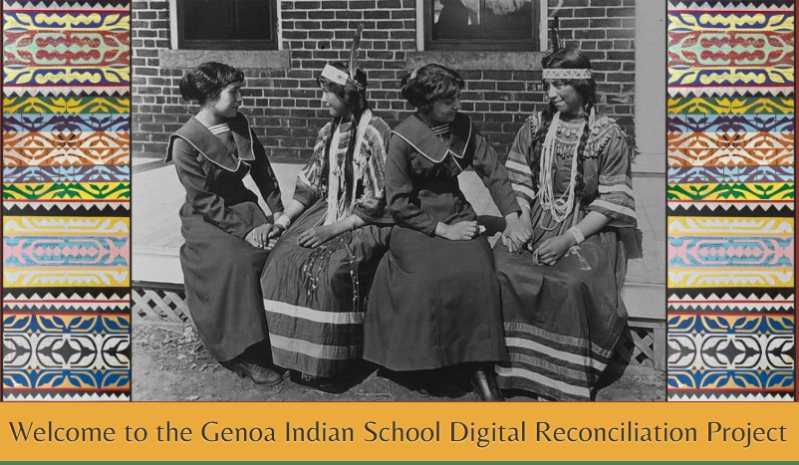Genoa School Digital Project
The Genoa project was created by Margaret Jacobs. The aim: ‘Bringing History Home’. The site was created to honour the Pawnee people – as it was their land that the Genoa school was built upon. This school was attended by ‘thousands of children from at least forty tribal nations’, and the site is offered to them, their descendants and communities – ‘who have survived and persevered despite the US governments attempt to eradicate Indian cultures. The site began by digitising government records of Genoa, and even the act of increasing public access of such documents already makes a massive difference to educating on the truth of the US’ colonial past. Their website states that their long-term aim is to support communities by ‘telling complete stories of Genoa’, to promote awareness for all Americans – an act of archival justice and historical recovery which reflects literary criticism’s goal of not only preserving but amplifying marginalised narratives. Literary criticism seeks to uncover gaps in historical narratives; Digital Humanities goes further in placing the result into the digital sphere – creating public access.
The Genoa project exemplifies postcolonial digital humanities. The digitisation of suppressed Indigenous narratives not only challenges the mass colonial erasure, but also their methodologies achieve justice, freedom, and Indigenous independence – important aspects of the Digital Humanities and postcolonial literary theory. The previous issue was that the archives that Digital Humanities production focused on were entrenched in colonialism; resulting in both knowledge and literary critical theory that reflected an inaccurate and systematically hidden history. This, postcolonial intervention has become urgent, to preserve narratives and create accurate education. Other examples are #TransformDH and Global Outlook::Digital Humanities, offer examinations of the political connotations for digital knowledge production. In scholarship, the intention is to intervene in the colonialised physical and consequently digitalised record by ‘fostering production of the multiple epistemologies for digital knowledge production that are needed to ensure that cultural heritage… finds a place in the digital record’. This work is reshaping the record, examining under-investigated ‘questions of power, globalisation and colonial and neocolonial ideologies. Furthermore, this shifts attention not only to the importance of criticism, but also the ‘vital need to resist the lingering influences of colonialism’ in the digital humanities.
However, even the critiqued archives still have gaps. The movement to digitise declassified documents will never be complete: there will always be redactions, and century-old erasure. The continuing effects of Empire lead to an unfinished cultural record. Therefore, to combat colonial erasure, the Genoa project confronts intentional absences in state records in an effort to not only preserve but directly draw attention to these gaps in history: as a continuing act of resistance.
